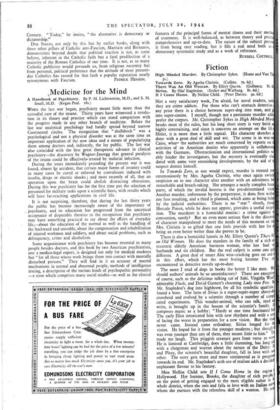A Handbook of Psychiatry. By P. M. Lichtenstein, M.D., and
S. M.
Small, M.D. (Kegan Paul. 16s.)
WHEN the last war began, psychiatry meant little more than the custodial care of the insane. Thirty years have witnessed a revolu- tion in its theory and practice which can stand comparison with the progress made in any other branch of medicine. Before the last war analytical psychology had hardly spread beyond narrow Continental circles. The recognition that " shellshock " was a psychological and not a physical disorder was at the same time an important application of the new ideas and a means of popularising them among doctors and, indirectly, the lay public. The last war also coincided with the first great therapeutic advance in clinical psychiatry—the discovery by Wagner-Jauregg that general paralysis of the insane could be effectively- treated by malarial infection.
During the years immediately preceding the present war it was found, almost by accident, that certain major forms of insanity could in many cases be cured or relieved by convulsions induced with insulin, drugs or electric shocks ; and most recently of all, that an operation upon the brain could abolish distracting obsessions. During this war psychiatry has for the first time put the selection of personnel for military tasks upon a scientific basis, with results which will have far-reaching applications in civil life.
It is not surprising, therefore, that during the last thirty years the public has become increasingly aware of the importance of psychiatry, and its education has progressed from the uncritical acceptance of disputable theories to the recognition that psychiatry may have something practical to say about the affairs of everyday life,—about the education of the normal as well as the handling of the backward and unstable, about the compensation and rehabilitation of injured workmen and soldiers, and about social problems, such as delinquency, crime and alcoholism.
Some acquaintance with psychiatry has become essential to many people besides doctors, and this book by two American psychiatrists, one a medico-legal expert, is designed not only for medical students but " for all those whose work brings them into contact with mentally disturbed persons." They will find in it an account of mental mechanisms in normal and abnormal people, methods of intelligence testing, a description of the various kinds of psychopathic personality —a term which comprises many social misfits—as well as the clinical
RUSSELL COTTRELL


























 Previous page
Previous page